Photo: Sean Mathis/Getty Images
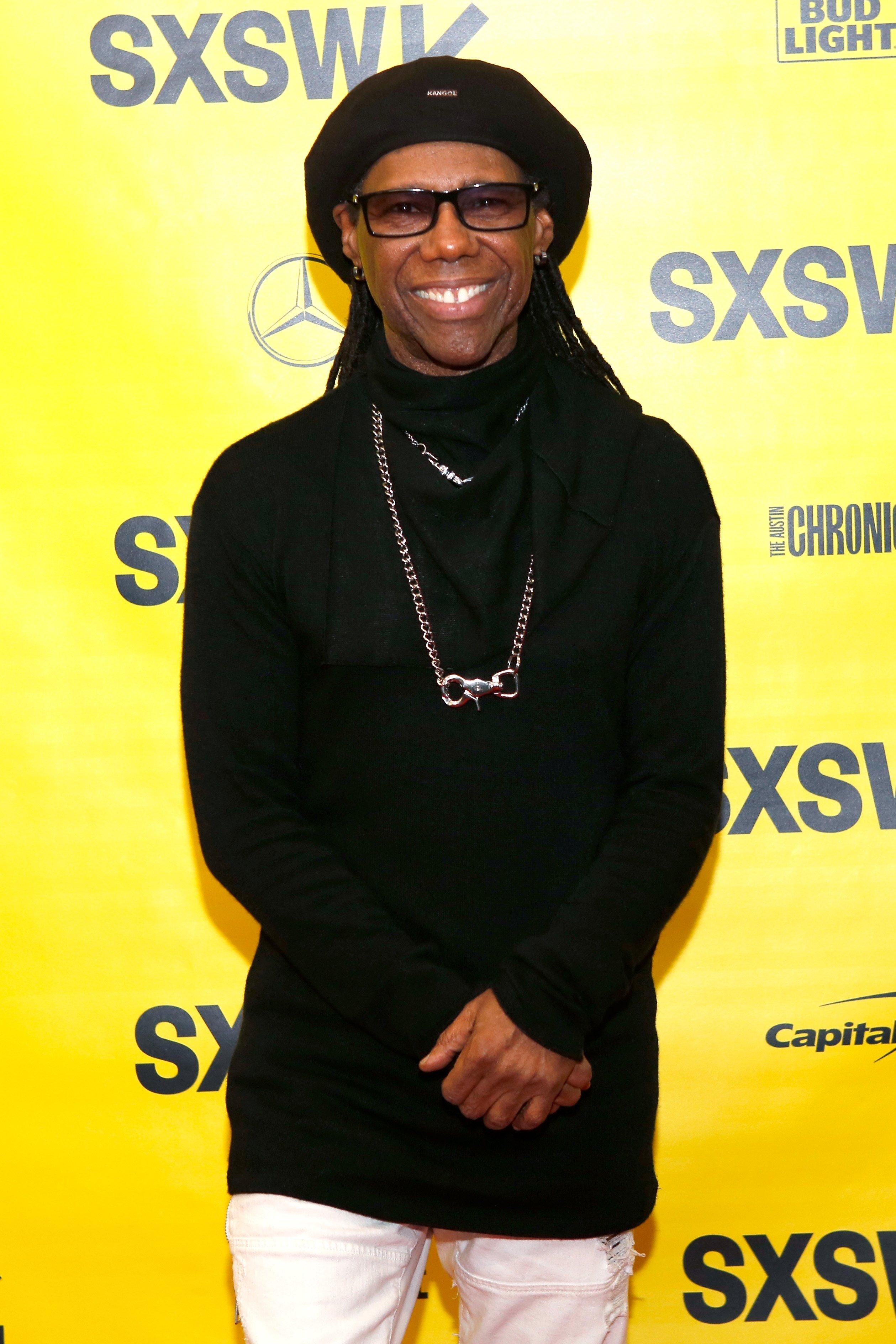
Nile Rodgers
news
Nile Rodgers Talks Abbey Road, Superstar Collabs At Coachella
With a new Chic album in the works at London's Abbey Road Studios and a new job title there, Rodgers raises our appetites for what's cooking
Named first-ever Chief Creative Advisor at London's Abbey Road Studios last month, Nile Rodgers found himself answering questions on April 21 at Coachella about who's been in the studio with him working on the upcoming Chic album, It's About Time. Rodgers learned late last year that his health is back in tune, and fans are looking forward to new innovations from the old-school funk master's knack for trend-setting originality.
<iframe width="620" height="349" src="https://www.youtube.com/embed/kcmGU_ldw0I" frameborder="0" allow="autoplay; encrypted-media" allowfullscreen></iframe>
In addition to the signature sounds he crafted for Chic and Sister Sledge, Rodgers also produced David Bowie's GRAMMY-nominated Let's Dance in 1983 and Madonna's Like A Virgin the following year. He shared three GRAMMY wins at the 56th GRAMMY Awards with Daft Punk, songwriter Paul Williams, and Pharrell Williams, including Record Of The Year for "Get Lucky" and Album Of The Year for Random Access Memories.
Rodgers had been working with Anderson .Paak on new Chic material at Abbey Road, while .Paak was opening for Bruno Mars. A track record like Rodgers' is what prompted Mars to say, "Damn, I gotta stop by and hang with y'all," joining them in the studio and creating an innovation of his own. Emerging artists Nao and Stefflon Don have also been working in London with Rodgers, as well as Craig David, Blondie's Debbie Harry, and Mura Masa.
Haim has been expected at Abbey Road Studios in London, to see what they create with Rodgers. Meantime at Coachella, opening for Beyoncé, the sisters created some beef by boasting "We will kick any band's ass!" Rodgers responded, "I will happily take the challenge," and warns the two groups might be staging some Battle-of-the-Bands get-togethers to duke it out.
Other artists expected to appear on the upcoming Chic project include Disclosure, Ray BLK and Jorja Smith. So we expect good times ahead from the man who brought us "Good Times" to begin with, featuring many of today's hottest artists.
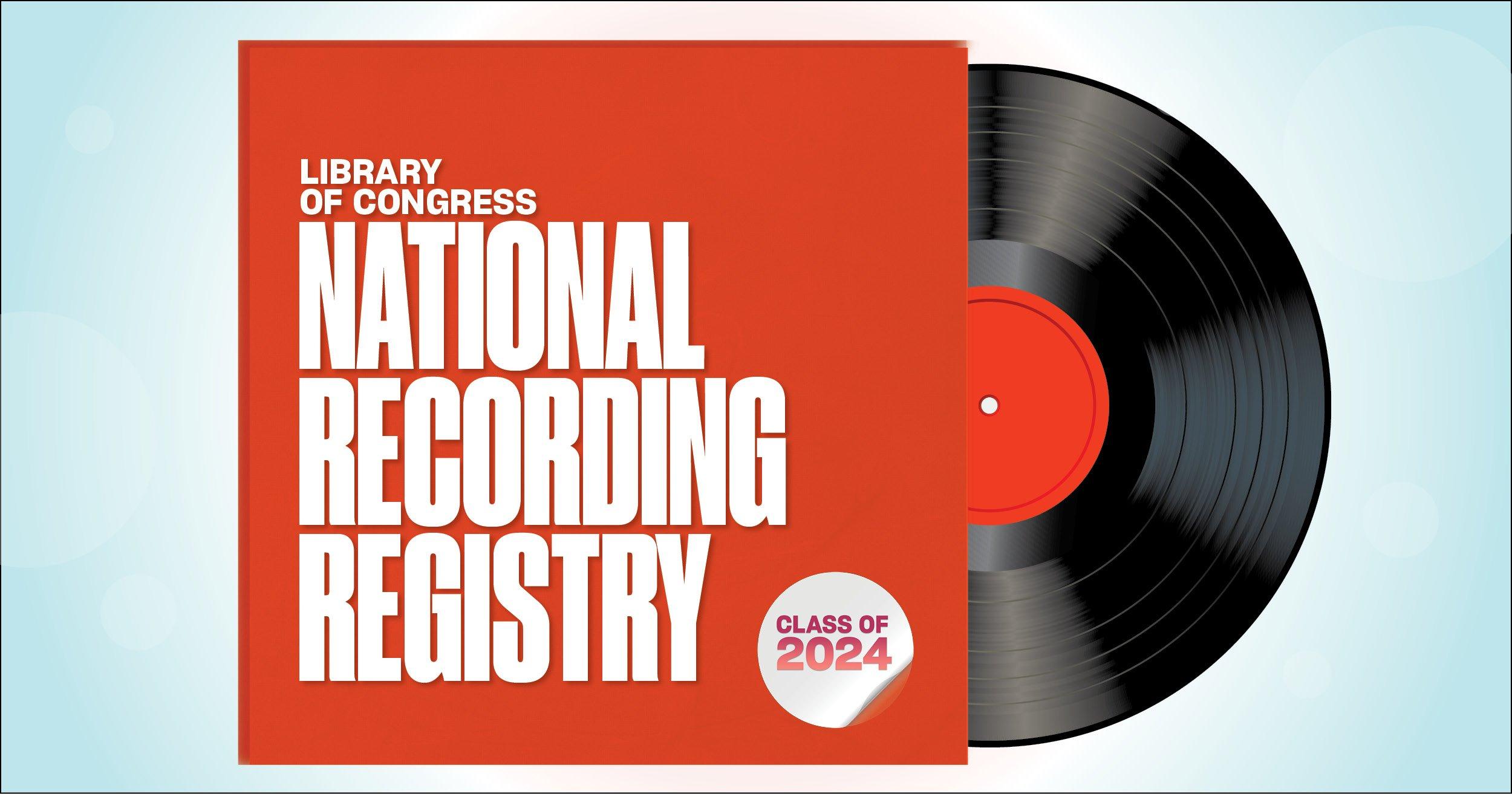
Photo: Library of Congress
news
National Recording Registry Inducts Music From The Notorious B.I.G., Green Day, Blondie, The Chicks, & More
Recordings by the Cars, Bill Withers, Lily Tomlin, Doug E. Fresh and Slick Rick, and the all-Black 369th U.S. Infantry Band after World War I are also among the 25 selected for induction.
As a founding member of the National Recording Preservation Board, the Recording Academy was instrumental in lobbying and getting the board created by Congress. Now, the Library of Congress has added new treasures to the National Recording Registry, preserving masterpieces that have shaped American culture.
The 2024 class not only celebrates modern icons like Green Day’s punk classic Dookie and Biggie Smalls' seminal Ready to Die, but also honors vintage gems like Gene Autry’s "Rudolph, the Red-Nosed Reindeer" and Perry Como’s hits from 1957. These recordings join over 650 titles that constitute the registry — a curated collection housed within the Library’s vast archive of nearly 4 million sound recordings.
Librarian of Congress Carla Hayden announced these additions as essential pieces of our nation’s audio legacy, each selected for their cultural, historical, or aesthetic importance. This selection process is influenced by public nominations, which hit a record number this year, emphasizing the public's role in preserving audio history.
Read more: Inside Green Day's Intimate "Right Here, Right Now" Global Climate Concert In San Francisco
"The Library of Congress is proud to preserve the sounds of American history and our diverse culture through the National Recording Registry," Hayden said. "We have selected audio treasures worthy of preservation with our partners this year, including a wide range of music from the past 100 years, as well as comedy. We were thrilled to receive a record number of public nominations, and we welcome the public’s input on what we should preserve next."
The latest selections named to the registry span from 1919 to 1998 and range from the recordings of the all-Black 369th U.S. Infantry Band led by James Reese Europe after World War I, to defining sounds of jazz and bluegrass, and iconic recordings from pop, dance, country, rock, rap, Latin and classical music.
"For the past 21 years the National Recording Preservation Board has provided musical expertise, historical perspective and deep knowledge of recorded sound to assist the Librarian in choosing landmark recordings to be inducted into the Library’s National Recording Registry," said Robbin Ahrold, Chair of the National Recording Preservation Board. "The board again this year is pleased to join the Librarian in highlighting influential works in our diverse sound heritage, as well as helping to spread the word on the National Recording Registry through their own social media and streaming media Campaigns."
Tune in to NPR's "1A" for "The Sounds of America" series, featuring interviews with Hayden and selected artists, to hear stories behind this year’s picks. Stay connected to the conversation about the registry via social media and listen to many of the recordings on your favorite streaming service.
For more details on the National Recording Registry and to explore more about the selections, visit The Library of Congress's official National Recording Registry page.
National Recording Registry, 2024 Selections (chronological order)
"Clarinet Marmalade" – Lt. James Reese Europe’s 369th U.S. Infantry Band (1919)
"Kauhavan Polkka" – Viola Turpeinen and John Rosendahl (1928)
Wisconsin Folksong Collection (1937-1946)
"Rose Room" – Benny Goodman Sextet with Charlie Christian (1939)
"Rudolph, the Red-Nosed Reindeer" – Gene Autry (1949)
"Tennessee Waltz" – Patti Page (1950)
"Rocket ‘88’" – Jackie Brenston and His Delta Cats (1951)
"Catch a Falling Star" / "Magic Moments" – Perry Como (1957)
"Chances Are" – Johnny Mathis (1957)
"The Sidewinder" – Lee Morgan (1964)
"Surrealistic Pillow" – Jefferson Airplane (1967)
"Ain’t No Sunshine" – Bill Withers (1971)
"This is a Recording" – Lily Tomlin (1971)
"J.D. Crowe & the New South" – J.D. Crowe & the New South (1975)
"Arrival" – ABBA (1976)
"El Cantante" – Héctor Lavoe (1978)
"The Cars" – The Cars (1978)
"Parallel Lines" – Blondie (1978)
"La-Di-Da-Di" – Doug E. Fresh and Slick Rick (MC Ricky D) (1985)
"Don’t Worry, Be Happy" – Bobby McFerrin (1988)
"Amor Eterno" – Juan Gabriel (1990)
"Pieces of Africa" – Kronos Quartet (1992)
Dookie – Green Day (1994)
Ready to Die – The Notorious B.I.G. (1994)
"Wide Open Spaces" – The Chicks (1998)
21 Albums Turning 50 In 2024: 'Diamond Dogs,' 'Jolene,' 'Natty Dread' & More
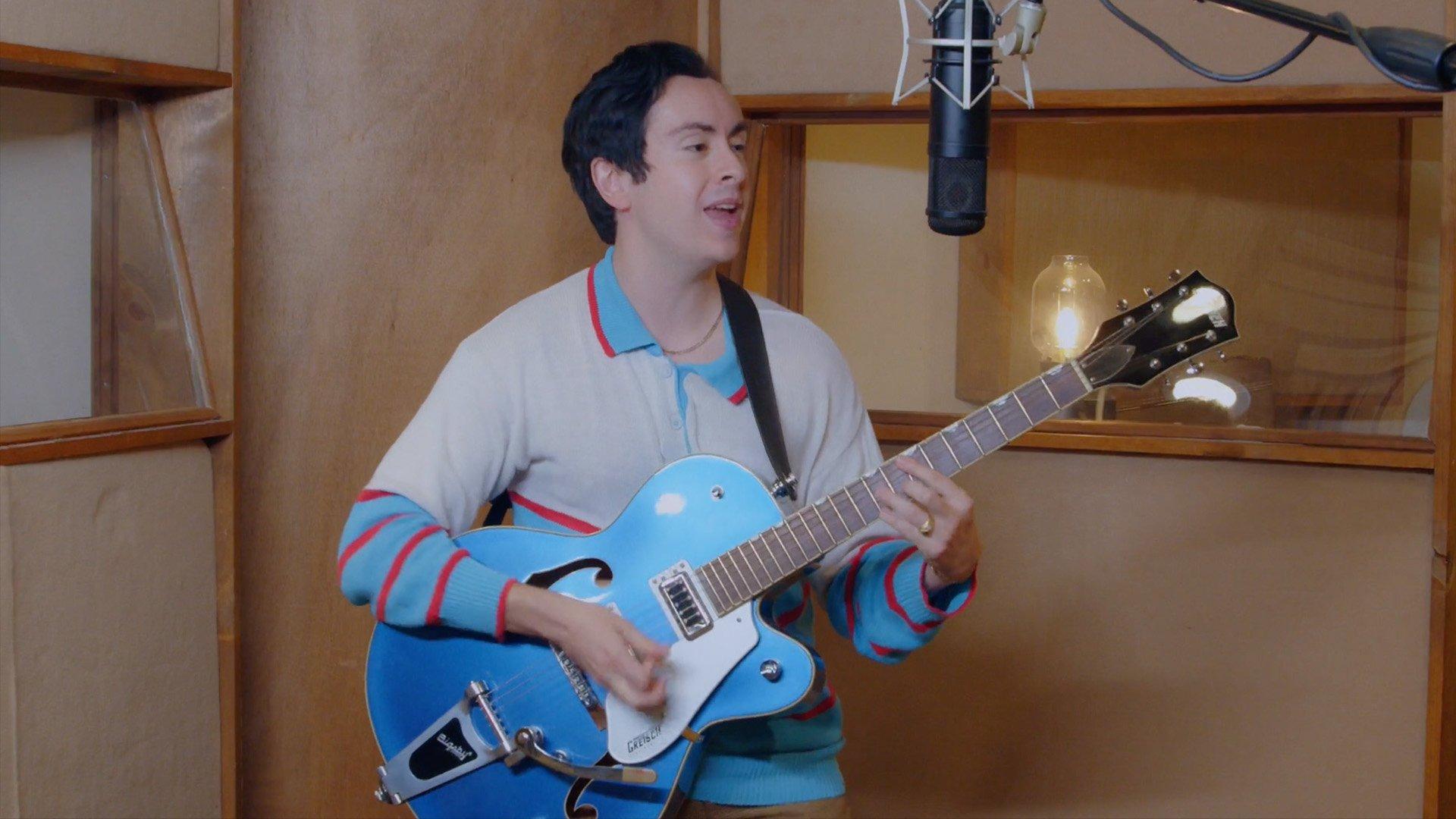
Photo: Courtesy of Dylan Chambers
video
ReImagined: Watch Dylan Chambers Channel Bruno Mars In This Groovy Cover Of "Uptown Funk"
Pop-soul newcomer Dylan Chambers offers his rendition of "Uptown Funk," Mark Ronson and Bruno Mars' infectious 2014 hit.
In the latest episode of ReImagined, soul-pop newcomer Dylan Chambers delivers a fresh, heartfelt take on "Uptown Funk", using an electric guitar to drive the performance.
In the year of its inception, Mark Ronson and Bruno Mars' "Uptown Funk" quickly made strides across the map, from a No. 1 peak on the Billboard Hot 100 to a Record Of The Year and Best Pop Duo/Group Performance win at the 2014 GRAMMYs. Ten years after its release, it is the ninth most-viewed YouTube video of all-time and was named one of Billboard's "Songs That Defined The Decade."
Chambers named Mars as one of his most influential inspirations and praised Silk Sonic's Las Vegas residency as one of the "greatest concerts" he has attended in an interview with Muzic Notez.
"Don't believe me, just watch," Chambers calls in the chorus, recreating its notable doo-wop ad-libs with the strums of his instrument.
Chambers dropped his latest single, "I Can Never Get Enough" on April 10, following his March release "High (When I'm Low)." Both tracks will be a part of his upcoming EP, For Your Listening Pleasure!, out May 17.
Press play on the video above to watch Dylan Chambers' groovy rendition of Bruno Mars & Mark Ronson's "Uptown Funk," and check back to GRAMMY.com for more new episodes of ReImagined.
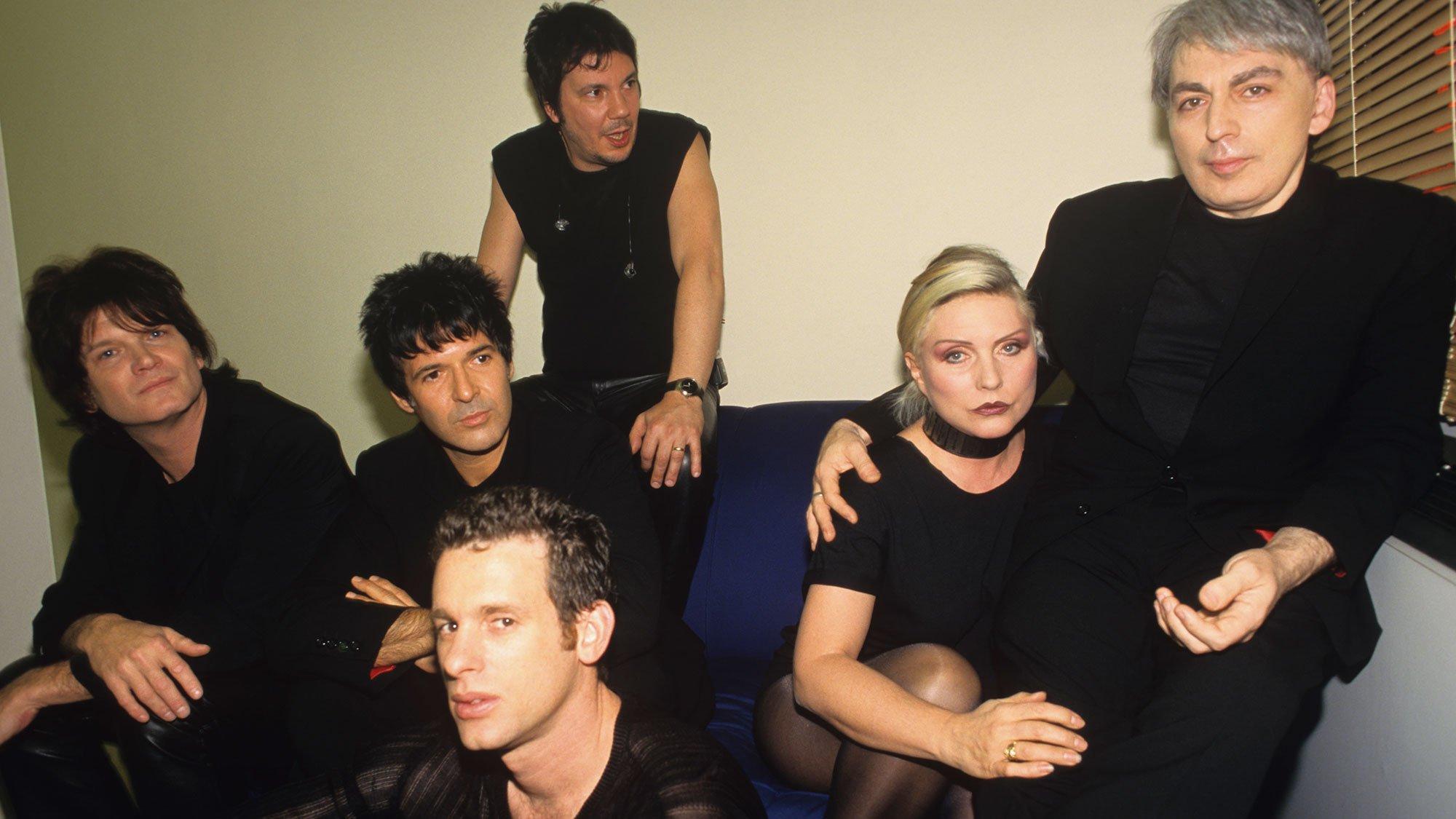
Photo: Patrick Ford/Redferns/GettyImages
feature
25 Years Later, 'No Exit' Shows Blondie Galvanizing Its Identity
Released in 1999 after a 15-year hiatus, Blondie's 'No Exit' was more than a reunion album. The edgy, eclectic and innovative album pulled Blondie back from the brink of history and into a new millennium.
"We felt there was no exit from Blondie," Clem Burke, long-standing drummer of Blondie, said in 1999.
Burke was speaking on the occasion of Blondie's new record, aptly titled No Exit. At the time, the band had reunited after a 15-year absence and, according to Burke, "reared its head again, a four-headed monster."
Although Burke jested about being unable to shake the pull of the band, No Exit was an edgy, eclectic and innovative record that pulled Blondie back from the brink of history and into a new millennium. The 17-track album saw the band restart their musical mission, delivering genre-blending punk music that brought experimental sounds to the mainstream while also parodying Americana. The reckless abandon shown with No Exit — from music genres to public image — proved a direct through-line to their peak new wave output.
No Exit was certainly a long time coming. The idea of a "reunion" for the famed band was never in the cards; even the idea of a greatest hits record was a no-go.After the release of 1982’s The Hunter — an album that fared poorly with critics and achieved little impact on the charts — the group chose to disband. Co-founder Chris Stein was diagnosed with an autoimmune disease and took time away from music; lead singer Debbie Harry began caring for partner Stein while also pursuing a solo music career and acting opportunities (including John Waters’ Hairspray); Burke went on to play drums for the likes of the Romantics and Iggy Pop; keyboardist Jimmy Destri began producing music for Prince and INXS.
A true reunion had to involve new music and a relaunch too. Stein recalled watching Jerry Maguire for the first time while recording No Exit in 1998. "I got all teary-eyed because the movie’s all about getting a second chance," he told the L.A. Times. "And that’s what this is about, you know? We’re getting a second chance."
Released on Feb. 23, 1999, No Exit was an energetic and eclectic mix of classic Blondie genres — pop and rock, reggae and rap — that pitched the band to a generation. No Exit eased the band back into a musical landscape dominated by rhythmic hip-hop tracks, velvet R&B anthems and thumping heavy metal.
Audiences at the dawn of the new millennium were already enjoying the success of other girl-fronted rock ensembles; groups like No Doubt, Garbage, and the Cranberries owed Blondie and Harry some credit for trailblazing. (Even if being a female-fronted band became a thorn in Blondie’s side, as seen by their 1978 "campaign" to correct the record with "Blondie is a group!" buttons.)
Now returning to the charts with such peers, Blondie signaled to the world their assignment was never over — even aging rockers could challenge music conventions and be punk again. Harry was center stage once more, reviving the band’s famed part-parody and part-femme fatale blond bombshell image for a new audience (and Blondie diehards).
Lead track "Maria" — a spirited song about romantic desire that also plays on religious idol worship — wasn’t quite classic Blondie but a sweet pop treat The song
hit No. 1 on the U.K. charts and also topped charts in Spain and Poland. Blondie were officially back in action, but their status left Stein a bit uneasy. "Now we were on the receiving end of a lot of accolades. At times it felt odd being hit with all the ‘legendary’ labels," Stein writes in his upcoming memoir, Under a Rock.
But it was no small feat to get Blondie back together. When they disbanded in 1982, they acknowledged that it was a "madhouse," with endless fighting and arguments all while Stein began to deteriorate from his chronic illness. While the band had sold more than 40 million albums in their decade-plus together and cemented themselves in the cultural lexicon, a new question emerged: Would their formerly edgy and eclectic sound resonate again?
Part of the band’s advantage in 1999 was also their original musical hallmark: a lack of a loyalty to any singular genre.
No Exit embraced Blondie’s classic musical eclecticism — a quality that saw some critics deride the record. An "album of hollow new-wave, ska, and rap retreads," Entertainment Weekly opined while Rolling Stone argued it "indulge[d] in the kind of dilettantish genre dabbling that preceded their 1982 demise." But Blondie’s uniqueness was always that their music output resisted easy classification; it wouldn’t be Blondie without any genre experimentation.
While looking back was important for the band when recording No Exit, it was also key to finding ways to appeal to a new generation of listeners. "We’re part of the future as well as the past," Harry said in 1999. "One of the stipulations I had was that it not be just a revue of Blondie’s greatest hits. I really felt convinced of and dedicated to the idea that we had to move ahead and do new music." That also extended to playfully redoing tracks they had originally recorded in the 1970s, including the Sangri-Las’ "Out in the Street."
Other songs on No Exit showed a playful and wry tenor, as the four original members were seemingly having fun reconnecting with each other. "Forgive and Forget (Pull Down the Night)" is a smooth and synthy dance track that recalls the Pet Shop Boys and gestures at forgiving past transgressions. Blondie cosplays as a country ensemble on "The Dream’s Lost on Me" with a structured and rhythmic country ballad that elevates Harry’s vocals. "Screaming Skin" takes their past reggae influences and recasts them in a rapid-fire rock song about breaking the betrayal of one’s body (likely a reference to Stein’s pemphigus condition attacking his skin).
Touring No Exit also fermented worries about Blondie’s legacy. "I don’t wanna appear preposterous on stage," Harry said at the time. In an attempt to defy such expectations, Blondie chose to perform the album’s hip-hop influenced title track during the American Music Awards, even bringing Coolio onstage.
The performance was true Blondie, which had long collaborated with artists of other genres to appeal to new audiences (their "Rapture" featuring Fab Five Freddy being case in point). "I was pleased with the mixed reaction," Stein said after the AMAs. "I’d much rather have us do something controversial than safe."
Today, "No Exit" might sound like a jarring marriage between classical music — with its use of Bach’s "Toccata and Fugue in D minor" — and thumping modern rap, but it isn’t a serious sonic exercise. Blondie instead impishly reminds us of the endless loop ("no exit") of their past music and the music industry, as their famed tunes might as well be as dated as those of the baroque era. The band goes philosophical with the reboot — even nodding to Jean-Paul Sartre’s bleak existential play No Exit — but conversely finds freedom adopting this adage.
The 1999 regrouping netted Blondie chart success, new fandom, and a world tour. Yet it also brought up some personal problems. In Under a Rock, Stein admitted he was trying to gradually decrease his use of methadone, but touring demands made recovery difficult.
Still, Blondie’s return helped galvanize their popular image as enduring punk and new wave pioneers. (It might not be surprising that no Blondie album since has charted as high as No Exit at No. 18 in the U.S. and No. 3 in the U.K.) The band hasn’t pumped the brakes either, riding the renewed popularity for decades since with new music and tours of the world over.
But No Exit offered audiences something that their four following albums haven't achieved: a cutting and experimental sound that also acknowledged the artifice of the pop rock music they were making. Even recent successes like 2017’s Pollinator sounded fun and youthful, but were a largely series of songs written or co-written by other artists that aimed to appease current pop music tastes.
The album title might sound suffocating or even nihilistic, but to Blondie No Exit was a belated self-acceptance. "I mean, there is no exit," Harry commented to journalist Michael Hill in 2013. "You work so hard to establish something, and then that’s it, there you are."
Twenty-five years on, Blondie showed a dawning new millennium who they were: A punk band who embraced sounds with abandon while celebrating the fantasy of being dissent rock stars. Like reading a sign "last exit before freeway," Blondie saw No Exit as a moment to hit the gas and drive straight on through.
'The Smiths' At 40: How The Self-Titled Debut Fired An Opening Shot For Indie Rock
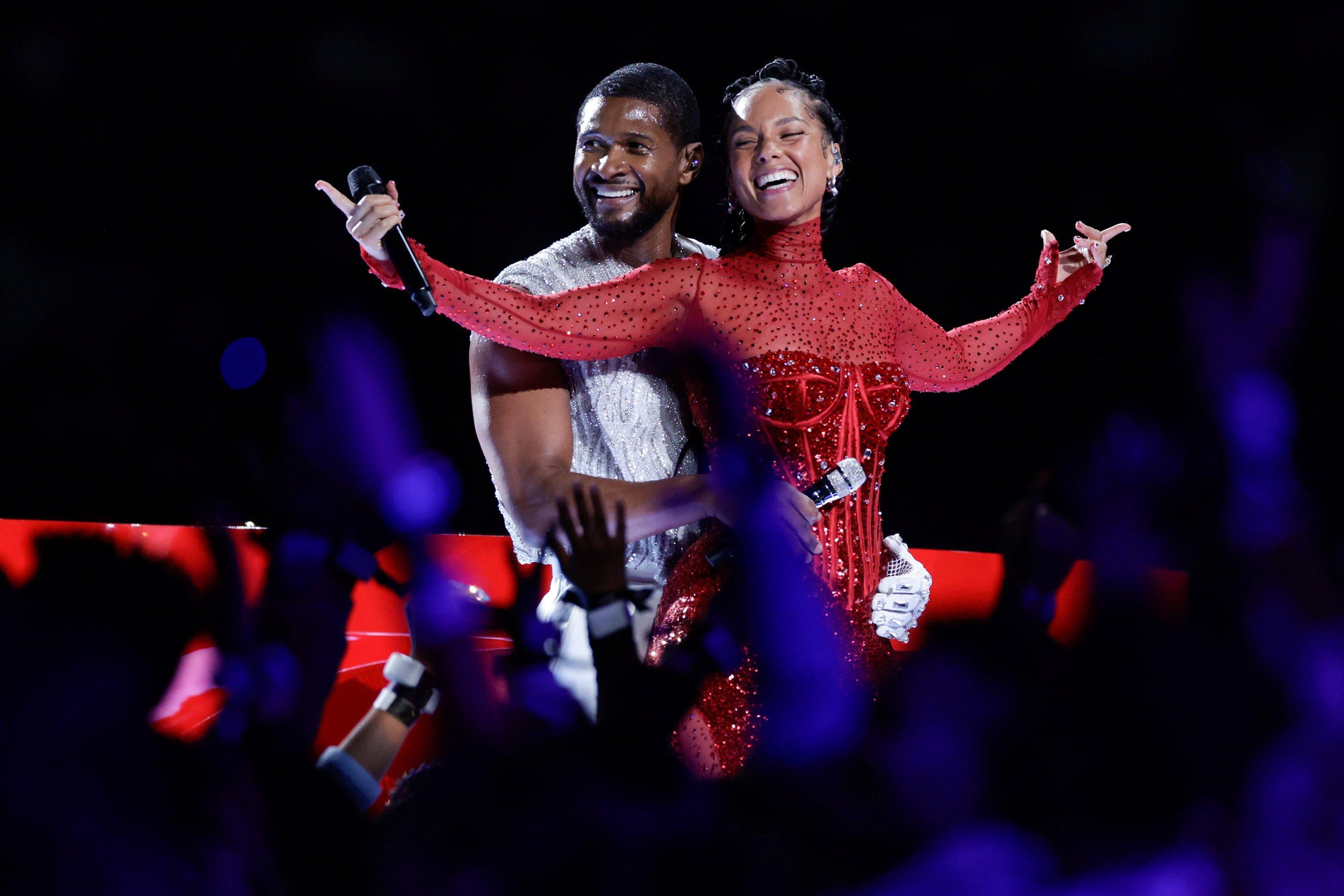
Photo: L.E. Baskow/Las Vegas Review-Journal/Tribune News Service via Getty Images
list
17 Love Songs That Have Won GRAMMYs: "I Will Always Love You," "Drunk In Love" & More
Over the GRAMMYs' 66-year history, artists from Frank Sinatra to Ed Sheeran have taken home golden gramophones for their heartfelt tunes. Take a look at some of the love songs that have won GRAMMYs.
Editor's Note: This is an update to a story from 2017.
Without heart-bursting, world-shifting love songs, music wouldn't be the same. There are countless classic and chart-topping hits dedicated to love, and several of them have won GRAMMYs.
We're not looking at tunes that merely deal with shades of love or dwell in heartbreak. We're talking out-and-out, no-holds-barred musical expressions of affection — the kind of love that leaves you wobbly at the knees.
No matter how you're celebrating Valentine's Day (or not), take a look at 18 odes to that feel-good, mushy-gushy love that have taken home golden gramophones over the years.
Frank Sinatra, "Strangers In The Night"
Record Of The Year / Best Vocal Performance, Male, 1967
Ol' Blue Eyes offers but a glimmer of hope for the single crowd on Valentine's Day, gently ruminating about exchanging glances with a stranger and sharing love before the night is through.
Willie Nelson, "Always On My Mind"
Best Country Vocal Performance, Male, 1983
In this cover, Nelson sings to the woman in his life, lamenting over those small things he should have said and done, but never took the time. Don't find yourself in the same position this Valentine's Day.
Lionel Richie, "Truly"
Best Pop Vocal Performance, Male, 1983
"Truly" embodies true dedication to a loved one, and it's delivered with sincerity from the king of '80s romantic pop — who gave life to the timeless love-song classics "Endless Love," "Still" and "Three Times A Lady."
Roy Orbison, "Oh, Pretty Woman"
Best Pop Vocal Performance, Male, 1991
Orbison captures the essence of encountering a lovely woman for the first time, and offers helpful one-liners such as "No one could look as good as you" and "I couldn't help but see … you look as lovely as can be." Single men, take notes.
Whitney Houston, "I Will Always Love You"
Record Of The Year, Best Pop Vocal Performance, Female, 1994
Houston passionately delivers a message of love, remembrance and forgiveness on her version of this song, which was written by country sweetheart Dolly Parton and first nominated for a GRAMMY in 1982.
Celine Dion, "My Heart Will Go On (Love Theme From Titanic)"
Record Of The Year, Best Female Pop Vocal Performance, 1999
This omnipresent theme song from the 1997 film Titanic was propelled to the No. 1 spot on the Billboard Hot 100 as the story of Jack and Rose (played by Leonardo DiCaprio and GRAMMY winner Kate Winslet) swept the country.
Shania Twain, "You're Still The One"
Best Female Country Vocal Performance, Best Country Song, 1999
Co-written with producer and then-husband Mutt Lange, Twain speaks of beating the odds with love and perseverance in lyrics such as, "I'm so glad we made it/Look how far we've come my baby," offering a fresh coat of optimism for couples of all ages.
Usher & Alicia Keys, "My Boo"
Best R&B Performance By A Duo Or Group With Vocals, 2005
"There's always that one person that will always have your heart," sings Usher in this duet with Keys, taking the listener back to that special first love. The chemistry between the longtime friends makes this ode to “My Boo” even more heartfelt, and the love was still palpable even 20 years later when they performed it on the Super Bowl halftime show stage.
Bruno Mars, "Just The Way You Are"
Best Male Pop Vocal Performance, 2011
Dating advice from Bruno Mars: If you think someone is beautiful, you should tell them every day. Whether or not it got Mars a date for Valentine's Day, it did get him a No. 1 hit on the Billboard Hot 100.
Cee Lo Green & Melanie Fiona, "Fool For You"
Best Traditional R&B Performance, 2012
It's a far cry from his previous GRAMMY-winning song, "F*** You," but "Fool For You" had us yearning for "that deep, that burning/ That amazing unconditional, inseparable love."
Justin Timberlake, "Pusher Love Girl"
Best R&B Song, 2014
Timberlake is so high on the love drug he's "on the ceiling, baby." Timberlake co-wrote the track with James Fauntleroy, Jerome Harmon and Timbaland, and it's featured on his 2013 album The 20/20 Experience, which flew high to No. 1 on the Billboard 200.
Beyoncé & Jay-Z, "Drunk In Love"
Best R&B Performance / Best R&B Song, 2015
While "Drunk In Love" wasn't the first love song that won Beyoncé and Jay-Z a GRAMMY — they won two GRAMMYs for "Crazy In Love" in 2004 — it is certainly the sexiest. This quintessential 2010s bop from one of music's most formidable couples captures why their alliance set the world's hearts aflame (and so did their steamy GRAMMYs performance of it).
Ed Sheeran, "Thinking Out Loud"
Song Of The Year / Best Pop Solo Performance, 2016
Along with his abundant talent, Sheeran's boy-next-door charm is what rocketed him to the top of the pop ranks. And with swooning lyrics and a waltzing melody, "Thinking Out Loud" is proof that he's a modern-day monarch of the love song.
Lady Gaga & Bradley Cooper, "Shallow"
Best Pop Duo/Group Performance / Best Song Written For Visual Media, 2019
A Star is Born's cachet has gone up and down with its various remakes, but the 2018 iteration was a smash hit. Not only is that thanks to moving performances from Lady Gaga and Bradley Cooper, but particularly thanks to their impassioned, belt-along duet "Shallow."
H.E.R. & Daniel Caesar, "Best Part"
Best R&B Performance, 2019
"If life is a movie/ Know you're the best part." Who among us besotted hasn't felt their emotions so widescreen, so thunderous? Clearly, H.E.R. and Daniel Caesar have — and they poured that feeling into the GRAMMY-winning ballad "Best Part."
Kacey Musgraves, "Butterflies"
Best Country Solo Performance, 2019
As Musgraves' Album Of The Year-winning LP Golden Hour shows, the country-pop star can zoom in or out at will, capturing numberless truths about the human experience. With its starry-eyed lyrics and swirling production, "Butterflies" perfectly encapsulates the flutter in your stomach that love can often spark.
Dan + Shay & Justin Bieber, "10,000 Hours"
Best Country Duo/Group Performance, 2021
When country hook-meisters Dan + Shay teamed up with pop phenom Justin Bieber, their love song powers were unstoppable. With more than 1 billion Spotify streams alone, "10,000 Hours" has become far more than an ode to just their respective wives; it's an anthem for any lover.
